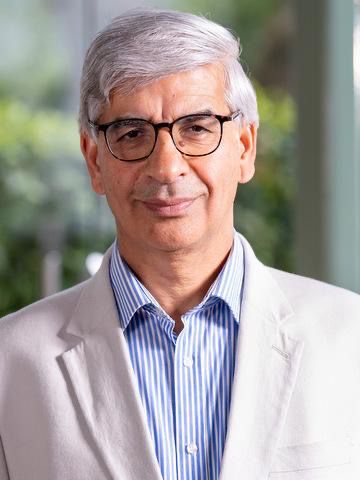By, Mas Danialissa Mahadi
KUALA LUMPUR, 17 October 2024: President of the International Association for Media and Communication Research (IAMCR), Professor Dr. Daya Kishan Thussu raised his concerns towards the change of global communication through geopolitics in his speech on the second day of the Communication and Media Centre International Conference (COMETIC) 2024 organised by the Communication and Media Centre (COMET) at ISTAC-IIUM. This forty-minute second keynote address discussed on five geopolitics opportunities that can change global communication.
Professor Dr. Daya, who is a scholar in global communication began his session with a notable insight from his international relations book titled, “Changing Geopolitics of Global Communication.” It stresses the massive change of the world with the rise of the rest that is referring to the rise of non-Western countries such as China, Russia, and India.
Briefly, global communication could be understood as a way of transmitting news and information through media all over the world. On the other hand, geopolitics refers to how countries manage and utilise their power to win over other countries. In this context, China is one of the growing countries who is challenging Western countries that are the current dominant countries of global communication.
China’s vision is one of the alternatives that could change the global communication framework by working on a new global communication and media strategy that represents its worldview, values, culture, and economics. “China is basically enhancing the state of its presence across the globe,” he said.
Reframing foreign affairs news in the media, is another way to transform global communication. To illustrate, Western media tends to contextualize information based on their preferences in line with pro-Western values, policies, and worldview. He believes that non-Western countries should lead in framing foreign affairs so as to have better control over the outcome in the form of public opinion.
Besides framing foreign affairs through the media, he encouraged audiences to think deeper and critically regarding the operations of media globally. Quoting his book, “It is now a completely regular occurrence to see experts from one think tank or another being quoted in top-tier media on major issues of international policy. They provide “much more than media quotes” and have become an “important part of the policy making process across the world.”
For him, the concept of Westlessness carries a crucial argument whereby Western societies and governments have lost a common understanding of what it even means to be part of the West. Non-Western citizens have the feeling of uneasiness and restlessness about the enduring objective of the West and whether the dominant Western countries could possibly become conjure a joint powerful strategy for competition in the new era.
Finally, Professor Dr. Daya commented that global communication should be less Westernised, not post-West in perspective. It argues that although the control of the West is declining, it has not completely disappeared. Nevertheless, non-Western countries should see this as an opportunity to strengthen their power so as to create a new version of global communication from their perspectives.***
